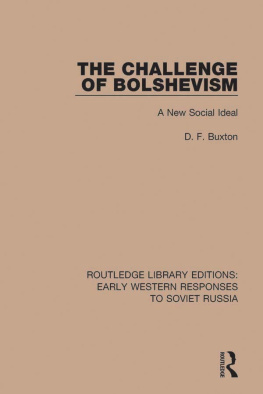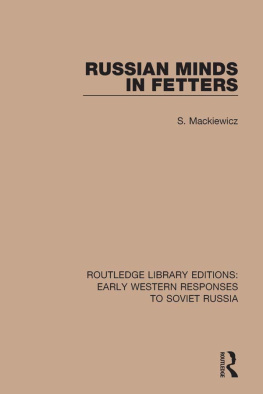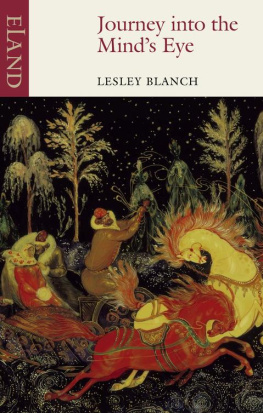Table of Contents
Guide
Print Page Numbers
ROUTLEDGE LIBRARY EDITIONS: EARLY WESTERN RESPONSES TO SOVIET RUSSIA
Volume 2
THE CHALLENGE OF BOLSHEVISM
THE CHALLENGE OF BOLSHEVISM
A New Social Ideal
D. F. BUXTON
First published in 1928 by George Allen & Unwin Ltd
This edition first published in 2018
by Routledge
2 Park Square, Milton Park, Abingdon, Oxon OX14 4RN
and by Routledge
711 Third Avenue, New York, NY 10017
Routledge is an imprint of the Taylor & Francis Group, an informa business
1928 Dorothy Buxton
All rights reserved. No part of this book may be reprinted or reproduced or utilised in any form or by any electronic, mechanical, or other means, now known or hereafter invented, including photocopying and recording, or in any information storage or retrieval system, without permission in writing from the publishers.
Trademark notice: Product or corporate names may be trademarks or registered trademarks, and are used only for identification and explanation without intent to infringe.
British Library Cataloguing in Publication Data
A catalogue record for this book is available from the British Library
ISBN: 978-1-138-04993-2 (Set)
ISBN: 978-1-315-11072-1 (Set) (ebk)
ISBN: 978-1-138-08426-1 (Volume 2) (hbk)
ISBN: 978-1-315-11182-7 (Volume 2) (ebk)
Publishers Note
The publisher has gone to great lengths to ensure the quality of this reprint but points out that some imperfections in the original copies may be apparent.
Disclaimer
The publisher has made every effort to trace copyright holders and would welcome correspondence from those they have been unable to trace.
The
Challenge of Bolshevism
A NEW SOCIAL IDEAL
By
D. F. BUXTON
TO THE NAMELESS HOST WHO, UNDER
THE TSARS, PERISHED AS MARTYRS TO
THEIR IDEALS OF JUSTICE AND FREEDOM
LONDON
GEORGE ALLEN & UNWIN LTD
MUSEUM STREET
First published in 1928
(All rights reserved)
CONTENTS
The Challenge of Bolshevism
AFTER a recent visit of twenty-four days to Russia, spent in Moscow and Leningrad, two provincial towns, and a country village, I asked myself what was the dominating impression that I carried away. Readers may be surprised, and some of them may be scandalized, to hear that I came to the conclusion that what impressed me most in Russia was a sense of the moral advance represented in the new order of society which the Communists are trying to establish.
This advance is to be felt in the new ideal that has been adopted for society and which is being inculcated through every possible means of propaganda and of education. It is an ideal radically different from our own. Whether we approve of it or not, it certainly behoves us to try to understand it.
Russia has a population of 140 millions. European Russia alone covers an area sixteen times that of the British Isles, and the whole U.S.S.R. one-seventh of the land surface of the globe. At the present rate of progress it will not be many years before every child born in this vast expanse will have passed through the Soviet schools. Even if for many years to come a certain proportion escape the schooling, they cannot, in any case, escape the Communist education. Society has already been largely remodelled, and in itself supplies the training-ground where mens minds are turned to the new ideal.
What, then, is this new ideal towards which Communism is working? The Bolsheviks call it a proletarian ideal, and contrast it constantly with our bourgeois ideal. Their ultimate ideal, as we all know, or ought to know, is a genuine democracy (in contrast to what they regard as our sham democracies), where such a thing as class founded on differences of wealth shall be no more. The wealth produced by society as a whole is to be at the disposal of society as a unit. All individuals shall receive according to their needs, and all shall give according to their powers; there shall be an equality of opportunity, both of opportunity to serve (which implies equal opportunities of education) and of opportunities to enjoy, i.e., as equal as possible a distribution of wealth. This ideal, of course, is not peculiar to Russian Communism; it finds acceptance among many who are not conscious followers of Karl Marx, its great exponent. As an ultimate ideal few would quarrel with it, so long, at any rate, as no serious steps were taken to hasten its advent. Outside Russia, however, this ideal for society receives little serious attention. This is partly because to the vast majority of people, if they ever hear of it at all, it appears merely visionary. (I will recur to the question whether it really is so visionary as most of us are inclined to think.) The second and more important reason, however, why the Russian Communists ideals receive so little serious consideration outside their own country is that the attention of mankind is riveted on the criminal nature, as it is made to appear, of the means which the Russian Communists adopt in pursuit of their ends. The British public is accustomed to associate their methods with wholesale robbery and murder, persecution of the middle class, disappearance of political freedom, and continued spying and plotting outside their own country. Attention is focused on what seem to us these moral outrages.
Before going further, I would like, therefore, to discuss whether it is not a mistake that the really great interest and importance of the objective which the Russian Communists have in view should be overlooked, while attention is focused on the defects of the means? The errors and crimes which occupy the attention of the public are in any case exaggerated,
The suppression of the Rebellion of 1905-6 (provoked by the failure of the Tsar to fulfil the promises of freedom contained in his October Manifesto) is a record of atrocities such as the Communists worst enemies would never think of attributing to them: executions on an immense scale, hanging, flogging (in some cases even to death), boys and even girls of fifteen years old being stripped naked for the purpose. No trial was required: it was enough that the soldiers should be able to accuse, e.g., a young girl of helping to stitch up a red flag.difficulties. And it was not only in times of disturbance but in times of peace that the Government and its representatives relied upon ruthless methods. In the early years of our present century peasants who defaulted in the payment of taxes were still liable to be strapped face downwards to a board and flogged. Cossacks were armed with knouts (whips with leather thongs and veritable instruments of torture), and used them freely, for instance, to disperse what they regarded as undesirable gatherings in the streets, or to drive back strikers into the factories. The very word Cossack inspired terror. Now the knout remains to be inspected in Museums of the Revolution, along with the iron manacles for the ankles and wrists, the models of pitch-dark cells for solitary confinement, and such-like records of the means by which the predecessors of the Bolsheviks sought to establish what represented itself to most of them, no doubt, as the true welfare of the people.


















